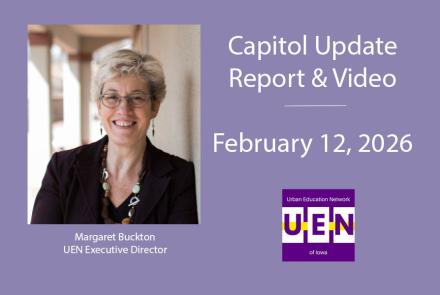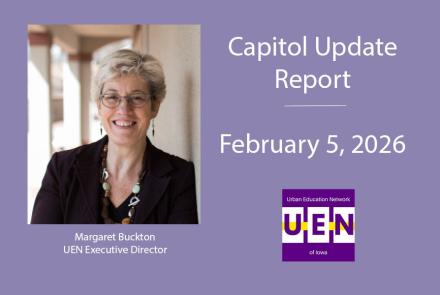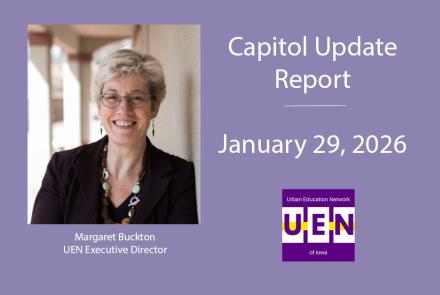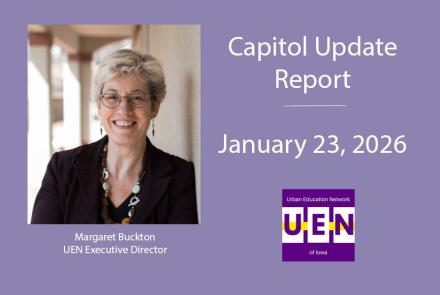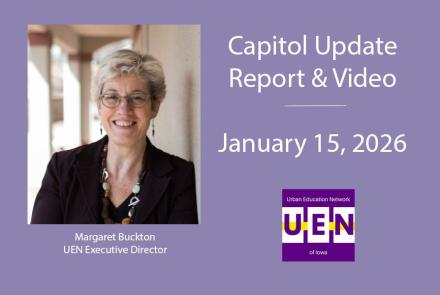Capitol Update - May 13, 2021
UEN Legislative Update
May 13, 2021
In this UEN Weekly Report from the 2021 Legislative Session, find information about:
- Status of Budget Bills: 2 Down, 9 To Go
- Accreditation Amendment to HF 868 Details
- Education Items Still Awaiting Action
- Bills Signed by the Governor
- Advocacy Action Steps This week and Connecting with Legislators During the Interim
Download the full May 13, 2021 UEN Capitol Update Report
Budget Bills Status in Both Chambers
The IALNS Newsletter reported the progress of budget bills required to be completed before the end of the 2021 Session. See the April 15 weekly report for details of HF 868 Education Appropriations line item, plus the details on the accreditation amendment below. The will is now in the Senate. Negotiations with House and Senate leadership and the Governor are happening behind the scenes as legislators seek the close of the 2021 Session. The daily per diem for legislators ended on April 30, which was the 100th day of the Session. Both the House and Senate adjourned without action early Thursday morning, indicating that agreement among the House and Senate Leaders and the Governor has not yet been reached.
SF 615 Standing Appropriations: this bill appropriates a total of $3.411 billion for State Foundation School Aid, which is an increase of $21.5 million compared to FY 2021. That total is well below the $53 million announced by Republican Leaders early in the Session and even further below the $95 million annual average increase of state resources for public education over the last decade. Within the appropriations to the DE, the following are reductions compared to current law, for a total reduction of $32.5 million for the three items combined (all of these are continued from the prior year):
-
- Limits the FY 2022 General Fund appropriation to DE for nonpublic school transportation to $8.2 million and requires the appropriation to be prorated if the claims exceed the appropriation.
- Suspends the General Fund standing appropriation of $14.8 million to DE for the Instructional Support Program for FY 2022, maintaining the state share at zero. (State law requires a 25% state funding for ISL, but that was never attained even when they were making a sizable contribution. It has been funded as zero since 2011.)
- Reduces the FY 2022 State school aid funding to Area Education Agencies (AEAs) by $15.0 million. This continues the annual reduction which has been in place for more than a decade.
- Appropriates $27.5 million for transportation equity (increase of $850,000) which funds the policy change made in SF 269 School Funding, which was signed by the Governor on Feb. 23.
- The House version, HF 894, cuts the AEAs by $12.5 million, which effectively restores $2.5 million compared to the current year’s appropriation level. That bill was approved by the House Appropriations Committee on May 6. Both bills are on their respective calendars. UEN is registered as undecided on both bills.
The Iowa Legislative News Service charts the progress on appropriations bills. Two of the bills, the Administrative and Regulation Appropriations bill and the Transportation, Infrastructure and Capitols bill, have been approved in both chambers, sending them to the Governor. The other nine budget bills await action in either chamber. Here is the status as of Thursday:
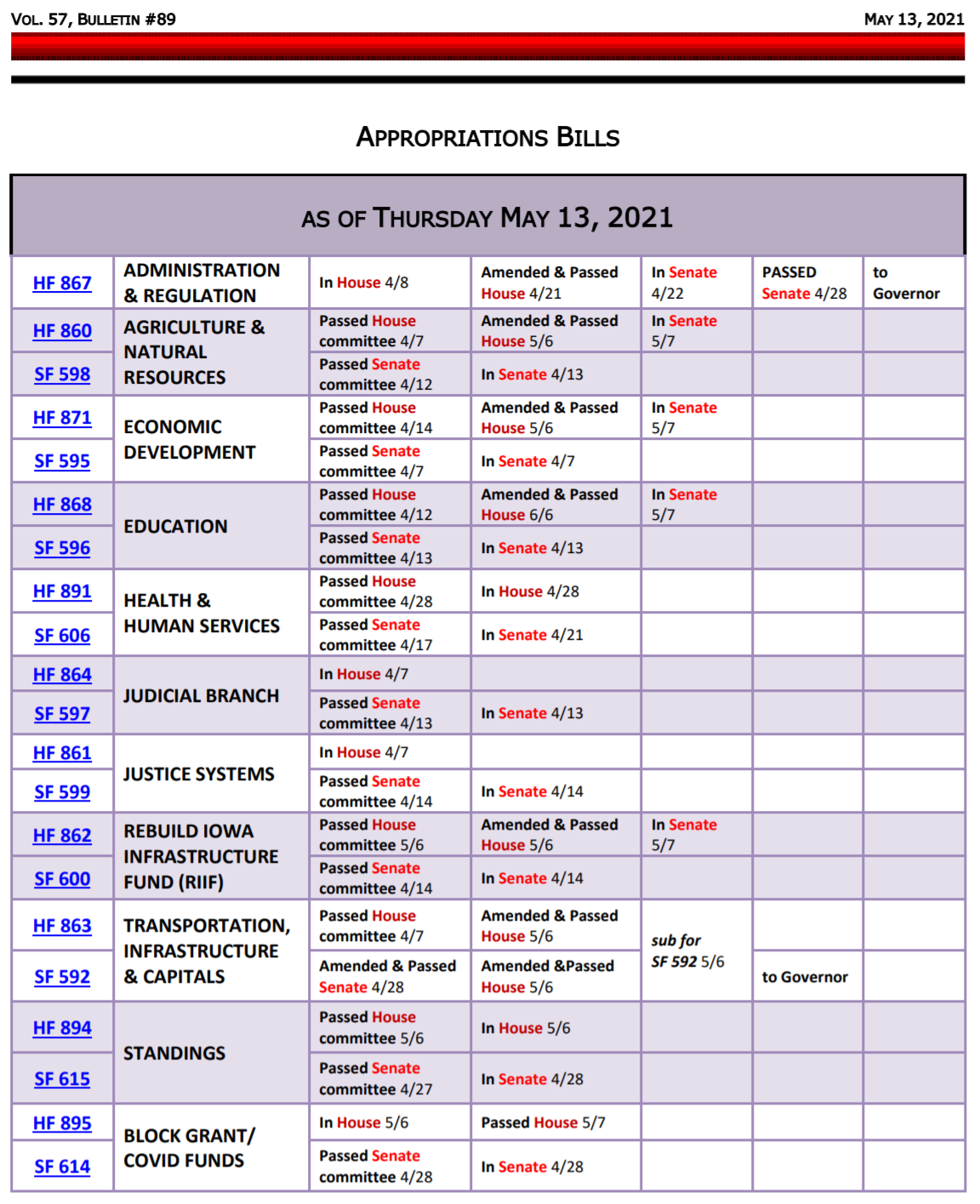
Amendment to HF 868 Education Appropriations regarding accountability, compliance and accreditation: this amendment appeared as ten pages of policy on the education appropriations bill, which is a departure from the normal process of stakeholder discussion and exchange of ideas. The amendment was first published on May 6 in the afternoon and approved during floor debate subsequent to suspending the House rules to debate an amendment that is not germane to the bill. The language was not introduced as a bill or amendment anytime earlier in the Session, so never receive subcommittee or committee action, which would have afforded opportunities for public input and improvement along the way. There has been lots of chatter about this amendment, ranging from some saying it is an overhaul of the accreditation system to others saying it merely codifies the current process. Our description below highlights what we see as significant changes. See advocacy actions for the week below, regarding this amendment. UEN is registered opposed to these provisions:
- Complaint Website: Requires DE to have a place on their website for parents and community members to make complaints (Rep. Brink says that DE has already done this and folks should check it out). Here’s a link to the formal written complaint process on DE’s website FYI https://educateiowa.gov/pk-12/special-education/dispute-resolution/formal-written-complaint-dispute-resolution
- Allows a public petition for public hearing: with signatures equal to 5% of those voting in the last school election, the amendment requires the board to hold a public hearing within 30 days on the proposal in the petition. Requires posting the public hearing on the districts’ website for at least 5 days prior to the hearing and the posting must include the contents of the proposal. If the proposal is regarding curriculum, the board may (but is not mandated) to suspend the curriculum pending the public hearing.
- Accreditation Process: Amends IC 256.11 subsections 10-11
- Renames accreditation process as an accreditation, monitoring and enforcement process and adds new areas of oversight. Currently, the existing purpose of accreditation is to ensure compliance with minimum education standards approved by the State Board of Education by rule. This amendment adds fiscal compliance, compliance with federal education laws (ESEA, IDEA and Civil Rights), all other requirements of this title (Iowa Code Chapter 256) applicable to schools.
- Changes Phase I monitoring which is currently limited to an annual desk audit. The amendment states that Phase I may include but shall not be limited to one or more desk audits as determined by DE. The amendment adds a remote site-visit option, adds review of district finances, review of local school board policies and procedures, and states the purpose of the Phase I process is to “bring school districts into minimum compliance with federal and state laws, regulations, and rules and no citation or corrective action may be designed to require more than minimum compliance.”
The current purpose of Phase I is stated for compliance with accreditation standards adopted by the state board of education. Phase I currently requires the DE to conduct site visits to address accreditation issues identified in the desk audit. Expansion of the desk audit to include this broader scope is likely to trigger additional site visits. IC 256.11(10)(2) states: “the purpose of a comprehensive site visit is to determine that a district is in compliance with minimum standards and to provide a general assessment of education practices in a school or school district and make recommendations with regard to the visit findings for the purposes of improving education practices above the level of minimum compliance.” The amendment eliminates this intended purpose of improving education practices and prohibits the DE or site visit team from recommending anything beyond minimum compliance.
-
- Other Phase I Changes: 1) Requires the DE to provide a written report annually to state BOE of any monitoring review resulting in multiple or substantial findings of non-compliance or findings that remain uncorrected for more than 30 days past the deadline set by DE. 2) Directs DE to eliminate duplicative reporting and prohibits DE from collecting information they aren’t directed to collect. 3) Adds enforcement mechanisms to phase I findings without State BOE action or district opportunity to appear or reply.
- Changes Phase II monitoring – conditions for a phase II: restates the same triggers for a phase II (although the expanded scope of Phase I may result in additional Phase II incidents.) There currently can be a Phase II in response to a petition signed by 20% of eligible electors or 20% of parents of children in the school, so that item is not a change. The amendment changes the makeup of the accreditation committee and specifies committee members, but this isn’t a substantive change. The process requires a visit to the district and then a committee report to DE within 30 days, including recommendation of enforcement actions.
- Enforcement: The amendment states: The department shall enforce the laws, regulations, and rules applicable to school districts and nonpublic schools consistent with the process outlined in this subsection. The department shall coordinate its enforcement of chapter 216 with the Iowa State Civil Rights Commission to reduce duplication of efforts. This is new language. It does not require a state board action or opportunity for the district to appear before the state board in early stages of the process regarding enforcement penalties which can now, by this amendment, happen at the Phase I level.
- If, after having opportunity to correct, if permitted, a non-compliance with federal laws, HF 744, HF 802, (these two new bills not yet signed by the Governor) the DE Director shall recommend and State BOE shall designate the district as high-risk grantee for federal purposes or withhold payment of state or federal funds, in whole or in part, until non-compliance is corrected.
- School district or school may respond to issues of non-compliance if they request to appear before the state board, but only if the recommendation of the committee is to deaccredit.
- Administrator Ethics Violations: the bill also requires an administrator, if found in violation of ethics requirements, to compensate the BOEE for the costs of the proceedings.
Bills Still Pending Legislative Action
HF 847 Education Practices and Flexibility: this bill contains several provisions from the Governor’s school choice policy, including new flexibility options for schools, and includes some other ideas from the legislature such as further expansion of the school tuition organization tax credit. The bill was amended to include needed changes to HF 813 Charter Schools through Senate action on April 28. The bill in over in the House, with the Senate Amendment attached. UEN is registered as undecided.
HF 532 Qualified Instructional Supplement: this bill is on Senate Calendar with amendment (defines the allocation formula of $27.2 million at $60 per student and includes a process for PK enrollment growth this Fall, supported with federal funding.) UEN opposes the original bill but supports the Senate Appropriations Committee Amendment. The bill needs approval in the Senate before sending it back to the House. We are hearing that the House and Senate are negotiating over the fiscal year from which the $27.2 million will be appropriated (either a supplemental appropriation in FY 2021 or a new appropriation in FY 2022). See advocacy actions for the week regarding this bill below.
HF 318 PK for Young 5s: this bill would allow districts to serve and count young five-year-olds in the statewide voluntary preschool program as a local control decision, however, the PK program is required to prioritize four-year-olds if there is limited space. It is on the Senate Calendar. UEN is registered in support.
SF 265 Parent Request to Retain: this bill allows a parent to request their student repeat a grade, due to lack of progress related to the pandemic year, with the request due by Aug. 15, 2021. We have heard that this is not likely to advance this year. UEN is registered as undecided.
SF 619 Tax Omnibus: this bill includes elimination of the PERL levy, but the House version, HF 893, does not. UEN is registered opposed to both versions, as both also signficiantly expand the School Tuition Organization Tax Credits level of credit and funding, growing from $15 to $20 million. Both bills are on their respective calendars.
Education Bills Pending Governor’s Action
HF 813 Charter Schools: See the March 26 UEN weekly report for details of HF 813. UEN was registered opposed to this bill.
HF 802 Diversity Training and Curriculum Limitations: See the April 29 weekly report for details of HF 802 which was amended in the Senate and the House concurred. UEN was registered as undecided on this bill.
HF 744 Protecting Free Speech: See the April 29 weekly report for details of HF 744 which was amended in the Senate and the House Concurred. UEN is registered as undecided.
Signed by the Governor
HF 228 Diversity Plans/Open Enrollment: House agreed to the Senate Amendment, sending it to the Governor. For the 2021-22 school year, no deadline to open enroll out of a district with a voluntary diversity plan on July 1, 2020. The March 1 deadline will apply for the 2022-23 and going forward. Signed by the Governor, May 10. UEN is registered opposed to the bill
Three DE Proposals signed by the Governor on April 30, more process clean-up than policy change:
HF 315 At-Risk Children: provides a little flexibility to the AEAs and DE in supporting early childhood programs for 3-, 4-, and 5-year olds. UEN is registered as undecided.
HF 317 Education Funding Calculation for Children in Facilities: this bill changes how schools calculate funding requests to the DE for providing education services to children in foster care, juvenile detention or residential treatment facilities, which codifies existing practices (billing based on days served rather than months). UEN is registered as undecided.
HF 388 Duties of the Child Development Coordinating Council: this bill strikes certain outdated duties of the CDCC on inventories of services for at-risk children and the development of regional councils. Signed by the Governor on April 30. UEN is undecided.
HF 602 General Fund Transfer to Student Activity Fund: this bill allows the school board by board resolution to transfer from the general fund to the student activity fund an amount necessary, as recommended by the superintendent, to fund co-curricular or extracurricular activities for which moneys from student-related activities such as admissions, activity fees, student dues, student fund-raising events, or other student-related co-curricular or extracurricular revenues failed to meet the financial needs of the activity as the result of restrictions placed on the activity related to the COVID-19 pandemic. The bill is retroactive to the budget year beginning July 1, 2020, and effective through June 30, 2023. This subsection is repealed July 1, 2023. The bill was approved in the House 94:2, in the Senate 48:0 (April 28) and the Governor signed it on May 10. UEN is registered in support.
HF 605 ELL Weighting: sets two weightings to generate funding for students served in limited-English proficient programs based on proficiency. An intermediate level with a weighting of .21 and an intensive level of .25, compared to the current weighting for all LEP students at .22. The 2013 ELL Task Force recommended tiered weighting, and this bill gets the policy in place. We will continue to work on weightings that approach the national average of .3 in the future. Thank your Representatives and Senators for their support of this policy that targets student needs. The Governor signed it on April 30. UEN is registered in support.
SF 260 Medicaid Billing Documentation: requires a receiving district providing special education to an open enrolled student to provide Medicaid billing documentation to the resident district. The Governor signed it on April 30. UEN supports this bill.
SF 466 Providers for Concussion Management at Extracurricular events: Adds occupational therapists to the list of possible providers. The Governor signed it on May 10. UEN is registered as undecided.
SF 532 Statement of Professional Recognition for Behavior Analysts and Mental Health Professionals: Requires the BOEE to develop these statements for licensure purposes. The Governor signed it on May 10. UEN is registered in support.
SF 546 Home Schooling Matters: this bill primarily deals with home school requirements but does have some cross-over in drivers’ education that impacts public school students. The bill does the following:
- Deems home schooling by a parent or guardian as competent private instruction and exempt from certain reporting requirements. Makes other changes on home schooling.
- Driver’s Ed: Includes home-schooling parents as teaching parents for driver’s education. Strikes the hours of instructional time and reduces the hours of driving time. Strikes certain hour requirements for instruction on RR crossings and adds requirements on sharing the road with bikes and motorcycles and distracted driving. Requires a teaching parent to have a clean driving record for two years.
- Allows all parents/guardians with a valid license to teach driver’s ed.
The House passed the bill as amended 59-33 (April 12). The Senate concurred and passed the bill as amended 33-15 (April 28); the Governor signed it on May 10. UEN is registered as undecided.
HF 201 Sex Offender Registry: this bill requires a sex offender who is required to register in another jurisdiction to register in Iowa while employed in Iowa or attending school in Iowa. It requires a person convicted of extortion to register as a Tier III sex offender if the court determines that the offense was sexually motivated. The House passed the bill 88-0 (Feb. 2). The Senate passed the bill 47-0 (April 28), and the Governor signed it May 10. UEN did not register on this bill.
Advocacy Actions This Week
HF 532 Qualified Instructional Supplement and PK Authority: Ask Senators to support the Appropriations Committee Amendment to HF 532 in the Senate and approve the bill, sending it back to the House. Since this $27 million is allocated to districts based on enrollment served, it’s a good balance to the federal funds distribution formula based on poverty. Without the PK provisions, schools are effectively reduced by $7 million in preschool funding due to a drop in 4-year-old preschool enrollment due to COVID-19. We fully expect a regular number of preschools in the fall of 2021.
Accreditation Amendment to HF 868: let Representatives know that school leaders see these changes as significant and we need a more inclusive process involving stakeholders to reform accreditation. The threshold for a petition to require a public hearing is very low. We would also like board authority to deny a second petition for a public hearing on the same issue. For more details and talking points, see the call to action posted here: https://www.uen-ia.org/call-action-update-accreditation-overhaul-hf-868
Gratitude: Pick one bill sent to the Governor that will help your district, and tell your legislators
THANK YOU for getting that done.
Connecting with Legislators: Start thinking now about building legislative relationships during the Interim, connecting with legislators at home. See the UEN Advocacy Handbook linked here for suggested advocacy actions based on the normal legislative cycle. Find the handbook on the members-only section of the UEN website. Contact Jen Albers for log in credentials if you are new to the website. Jen@iowaschoolfinance.com
Find biographical information about legislators gleaned from their election websites on the ISFIS site here: http://www.iowaschoolfinance.com/legislative_bios Learn about your new representatives and senators or find out something you don’t know about incumbents.
Find out who your legislators are through the interactive map or address search posted on the Legislative Website here: https://www.legis.iowa.gov/legislators/find
To call and leave a message at the Statehouse during the legislative Session, the House switchboard operator number is 515.281.3221 and the Senate switchboard operator number is 515.281.3371. You can ask if they are available or leave a message for them to call you back.
Advocacy Resources:
Check out the UEN Website at www.uen-ia.org to find Advocacy Resources such as Issue Briefs, UEN Weekly Legislative Reports and video updates, UEN Calls to Action when immediate advocacy action is required, testimony presented to the State Board of Education, the DE or any legislative committee or public hearing, and links to fiscal information that may inform your work. The latest legislative actions from the statehouse will be posted at: www.uen-ia.org/blogs-list. See the UEN Advocacy Handbook linked here, which is also available from the subscriber section of the UEN website
Thanks to our UEN Corporate Sponsors:
Special thank you to your UEN Corporate Sponsors for their support of UEN programs and services. You can find information about how these organizations may help your district on the Corporate Sponsor page of the UEN website at https://www.uen-ia.org/uen-sponsors.
|
 |
Contact us with any questions, feedback or suggestions to better prepare your advocacy work:
Margaret Buckton
UEN Executive Director/Legislative Analyst
margaret@iowaschoolfinance.com
515.201.3755 Cell


